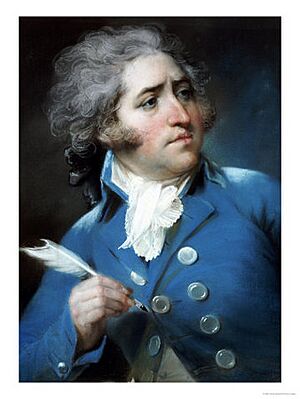Edward Topham facts for kids

Edward Topham (born 1751, died 1820) was an English journalist and writer. He was famous for telling everyone about the Wold Cottage meteorite, a space rock that landed on his land!
Contents
Early Life and Army Days
Edward Topham's father, Francis Topham, was a judge in York. Edward went to Eton College, a famous school, for eleven years. While there, he enjoyed writing poetry.
After school, he went to Trinity College, Cambridge, but he left without finishing his degree. He then traveled around Europe and spent six months in Scotland. When he came back in 1776, he wrote a book called Letters from Edinburgh, sharing his observations about Scottish life.
Next, Edward moved to London and joined the army. He became a "cornet" (a junior officer) in King George III's Horse Guards. For about seven years, he was the adjutant, which means he helped organize the regiment. He made his regiment very efficient, and the King even thanked him! People called him "the tip-top adjutant." Later, in 1803, he became a Captain in the Yorkshire Wolds Cavalry.
Life in London Society
Edward Topham quickly became well-known in London's fancy society. People noticed his unique style of dressing and his polite manners. His friend, Frederic Reynolds, even copied some of Edward's habits for characters in his plays!
Edward was also good at writing special introductions and endings for plays. This helped him meet famous actors. He wrote an ending for a play that was so popular, it filled the Drury Lane theatre for many nights! He also wrote another popular ending for the actress Miss Farren. He became good friends with an actress named Mary Wells, and they had four children together.
Edward wrote several plays during this time:
- Deaf Indeed (1780)
- The Fool (1786) – This play was well-liked because Mrs. Wells played her part so well.
- Small Talk, or the Westminster Boy (1786)
- Bonds without Judgment, or the Loves of Bengal (1787)
Starting a Newspaper
On January 1, 1787, Edward Topham started his own daily newspaper called The World. He wanted to help Mary Wells become more famous through the paper. Two of his main helpers were Miles Peter Andrews and Charles Este. John Bell, a publisher, also helped manage the paper.
At first, the newspaper was known for its strong opinions about people. It also featured poems by a group called the Della Cruscans. Edward wrote articles called The Schools, where he shared memories of his friends from Eton.
His book, Life of the Late John Elwes (1790), first appeared in The World. This book was about a very careful person (sometimes thought to be the inspiration for Ebenezer Scrooge!). It was so popular that it was printed many times and even translated into German. People said it made The World sell a thousand more copies every day! Another big hit for the paper was the letters between two rival boxers, Richard Humphries and Daniel Mendoza.
Retirement and the Meteorite
After five years, Edward sold his newspaper. He then moved to Wold Cottage in Yorkshire with his three daughters. People thought he planned to spend his time farming and writing his life story. He was known for having excellent hunting dogs, and his greyhound, "Snowball," was one of the fastest ever!
While Edward was living at Wold Cottage, something amazing happened. On Sunday, December 13, 1795, a meteorite fell from the sky! It landed in a field near his house. Edward wrote a letter in 1796 saying that the warm, smoking rock weighed about 25 kilograms (56 pounds) and had buried itself deep into the ground.
Part of this meteorite was shown in a museum in London and is now at the Natural History Museum, London. In 1798, Edward published a book about the meteorite. The next year, he even built a stone column at the spot where it fell!
Edward Topham passed away in Doncaster on April 26, 1820, at 68 years old. He was a local judge for many years. His three daughters were known as the best horse riders in Yorkshire!
 | Shirley Ann Jackson |
 | Garett Morgan |
 | J. Ernest Wilkins Jr. |
 | Elijah McCoy |

